#the public theater
Text

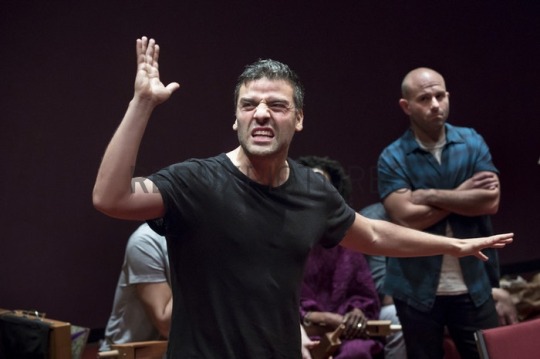

Il materiale di origine: Sara Krulwich for The New York Times / Oscar Isaac onstage as Hamlet at The Public Theater in New York City. (18th June, 2017)
553 notes
·
View notes
Photo

The Public Theater poster
Paula Scher
49 notes
·
View notes
Text
Playwright James Ijames on 'Fat Ham,' the spotlight on Black queerness and life after a Pulitzer
A Q&A with the Pulitzer Prize–winning playwright of 'Fat Ham.'
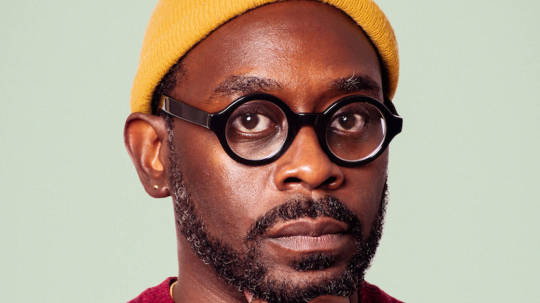
Written by Marcus Scott
Wednesday February 8 2023
James Ijames won the 2022 Pulitzer Prize for Drama for Fat Ham, an irreverent riff on William Shakespeare’s Hamlet that feels like a call to arms for Black joy and queer representation. A jambalaya of satire, magical realism and the American domestic sitcom, the play follows Juicy (Marcel Spears), a morose online-college student, as he tries to come to terms with the marriage of his newly-widowed mother, Tedra (Nikki Crawford), to his Machiavellian uncle Rev (Billy Eugene Jones). “This ain’t Shakespeare,” Ijames noted in the show’s program. “Don’t get me wrong. I love Shakespeare, this just ain’t him. This ain’t a tragedy…This play is offering tenderness next to softness as a practice of living. This play is celebrating Blackness that is traditional and weird and lonely and happy and grieving and honest and frightened and brave and sexy and churchified and liberated and poetic.”
Fat Ham had its world premiere in the spring of 2021 in a digital production by Philadelphia’s Wilma Theater. A year later, it made its onstage debut at the Public Theater, directed by Saheem Ali, and became one of the buzziest plays of the season. On March 21, 2023, that production will begin a limited run at Broadway’s American Airlines Theatre. We chatted over FaceTime with the playwright as he prepared to step into rehearsals.
Fat Ham moves Hamlet from a medieval Danish castle to a modern-day cookout in North Carolina. Why a barbecue?
“Barbecues are cumulative spaces. It starts with a few people and then it grows. There’s food, and people are drinking. It’s a space of truth-telling, it’s a space of game-playing, it’s a space of intimacy and warmth—and it’s where secrets come out. My family recently came together for the Christmas holiday and a cousin of mine made an announcement about being pregnant. Everyone was just so excited and lifted by that; everyone’s energy turned towards them in this really beautiful way. I wanted a space where that sort of collective joy was possible and also where a big, messy argument was possible. Where a fight was possible, where drinking was possible, where eating was possible, where romance was possible. In Shakespearean comedies, when you go outside or into the woods—like the forest of Arden [in As You Like It] or the forest in Midsummer—it’s a space where anything’s possible. There’s magic. We’re not inside, in a cold room in a cold castle. We’re outside: We have decorations, we’re colorfully dressed. We are in the sort of space where magic is palpable and possible.”
Juicy is not your typical Hamlet. He is Black and Southern and, as you describe him in the play, “thicc.” What was the motivation behind that?
“Well, I’m Black and from the South, and that drove my desire to play with people that sound and look like me. When you see productions of Hamlet, he's usually white and sort of athletic. I wanted to make a version of this play that was open to a body type that wasn't that; I'm a person who, for pretty much my whole life, has had some struggle with my weight and my perception of what I look like and how I feel in my body. And another thing I wanted to do was to explore Blackness in the South in a way that felt contemporary, that didn't feel held by history—looking at Southern communities right now as opposed to a nostalgic imagination of the Black South.”
Why did you choose for Juicy to have a passion to study Human Resources in college?
“Human Resources is about care and workflow. Efficiency. I wanted Juicy to have a passion for something that felt antithetical to his father. He wants to make sure people are okay.”
How does that contrast reflect other things about the way you have approached Shakespeare’s story?
“I think the play is exploring multiple modalities of masculinity. We see a lot of different kinds of Black masculinity on the stage. We see Juicy, we see Tio, we see Larry, we see Pap and Rev. And there’s a masculinity that’s implied about the community that they live in, that is sort of present in the room. I wanted to show that masculinity is not monolithic—it’s not as simple or cut-and-dried as it’s often depicted. I also wanted to explore cycles of trauma and violence in families. I’m interested in primordial stories, stories that no matter what culture you walk into, there’s like a version of them. I always think of Hamlet as—and I don't know that a lot of people think of it this way—but I think of Hamlet as a Cain and Abel story: the story of a sibling killing their sibling to get ahead. Anybody can relate to that; that’s a [narrative] that you inherit and moves with you through generations. And the younger folks in the play have to make some decisions about whether or not they want to continue that, whether that’s what they want their lives to look like and their relationships to each other to look like. I’m calling into question the stories that we’ve been passed down as wisdom. Because sometimes it’s wisdom, but more and more I look at those stories as cautionary tales of what you shouldn’t do. Vengeance isn’t gonna help Juicy. Killing his uncle is not gonna help Juicy’s life get any better.”
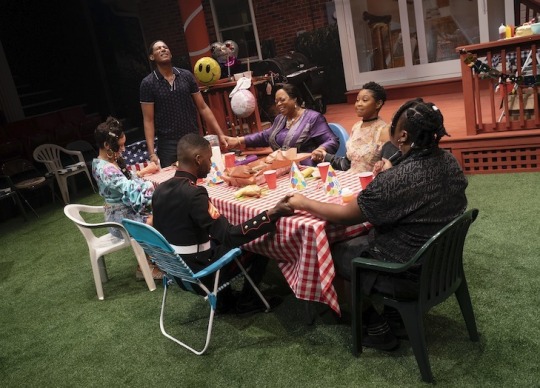
Your breakthrough play was Kill Move Paradise in 2017. How do you think you've changed as a writer since then?
“Oh, gosh. When I look at Kill Move Paradise, that play is quite erratic, you know [he laughs]. I always describe it as the way that I try to metabolize my anger and my fear and anxiety about being a Black body driving around in America, walking around in America, just trying to live my life. And so it has that anxiety in it. It has that fear and nervousness in it. It’s in the text, you can feel it on the page. As I've gotten a little older, I've experienced more and I've written more—the more you write, the better writer you become. I'm more intentional with story, with plot; how I'm weaving a theme or a theory into the action of a play is a bit more sophisticated than it was when I was starting out. The anger is usually shrouded in rebellion or exuberance. At a point in my life, anger sort of dragged me down into a space of high-blood-pressure fury. But I think now the work offers people an invitation to metabolize anger in a different way. By the time we get to the end of Fat Ham, people are dancing in the aisle.”
They certainly are.
“And that is not to negate the fact that we’ve just watched the thing that had pain in it, that had trauma in it, that had violence in it. But just because you’ve been through difficulty doesn’t consign you for the rest of your life to difficulty, to trauma, to pain. We have access to joy, we have access to resilience, we have access to exuberant ecstasy. Black history, in this country in particular, teaches us that: The blues and jazz and hip-hop come out of extraordinary awful scenarios and settings. Those art forms are undeniably both Black, but undeniably exuberant, resilient, unabashed, queer—all of those things! They possess all of those things. When I sit down to write a play, I know that at the end I have to send people out into the world, into the streets, into workplaces, into homes. My hope is that I’m leading them to some hope.”
This play is pretty fantastical, and there are various displays of spectacle and magic. There are also a panoply of images and homages to the Pan-African cultural experience—allusions to Louisiana Voodoo as well as Central African, Creole and Haitian Hoodoo symbology.
“Ghosts are a feature in a lot of my plays. Magic is a feature in a lot of my plays. Because I’m a person who grew up with people who kind of had magical ways of thinking. I grew up Baptist: hardcore, every Sunday, sang in the choir, youth ministry, youth usher—like, I am a church gay! I also grew up in a family that has New Year’s Eve traditions that they do, and will throw salt over their shoulder, or say “Don’t sweep over a single man’s shoe because he won’t get married.” That sort of Hoodoo connection to the spirit world and connection to ancestors was also a big part of the family that I grew up in. And so magic in that respect feels very real to me. Ancestors feel very present—the reverence for people who have passed on is immense. So, to me, the ghost of Juicy’s father showing up isn’t just a specter from this other world that is coming with caution and with information. Juicy is having a conversation with his ancestor and he talks to his ancestor, the way that I talk to mine. The thinness of that veil between here and there—I relish in that, and the theatrical allows you to do that with a lot of ease. I didn’t want the ghost to be a joke. He’s funny—that cat is extremely funny—but he also has these great moments of, like, “Wow, I really messed you up.”
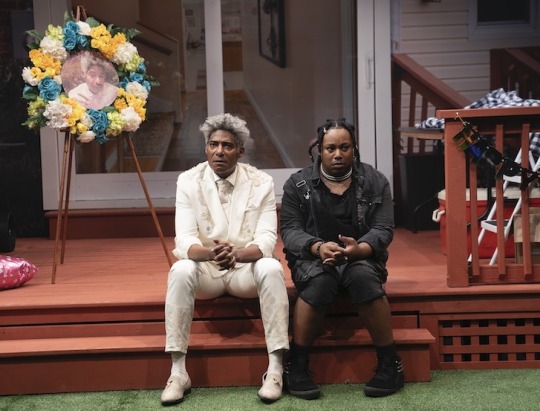
There is a long literary tradition of Black writers explaining Blackness to people who aren’t Black. You don’t do that here. In fact, this play comments on performing Blackness, trauma porn and “enterpainment” on stage—and it’s done with humor. Why was this important to you?
“Humor is powerful. It opens us up to hearing things in a new way. It’s a big part of all of my plays. The question about explaining Blackness is huge to me. I don’t feel like I have to explain Blackness to an audience. I’m assuming that everyone will catch up who doesn’t understand.”
At the end of the show, there’s a cover of the funky dance-pop disco tune “Kill The Lights” sung by Broadway actor Mykal Kilgore. What inspired that particular needle drop?
“I love disco music, just personally. Anybody can dance to it. If you are off-rhythm, you will be on a rhythm with disco music because it’s four-on-the-floor and is just all-encompassing. It strives for ecstasy, it strives for moving from a passage from one state to another. Probably because they were all like using drugs and having sex while they were listening to it in the Seventies and Eighties. But this is a contemporary artist singing in the disco style. It’s not a song from the era. It just moves people! That music moves people.”
If you were to classify your previous plays by genre, with Fat Ham being disco, what would your other shows be?
“Ooh.” [He laughs.] “I think Kill Move Paradise, if I had to put a genre to it, it’s Southern hip-hop, right? It’s sort of grounded in that culture. I would say White is like pop music—it’s like my Ariana Grande album. And Miz Martha is Americana music. It’s like bluegrass with a trap beat.”
Only nine writers of Black descent have been awarded the Pulitzer Prize for Drama in its 105-year history: Charles Gordone for No Place to Be Somebody, Charles Fuller for A Soldier’s Play, August Wilson for Fences and The Piano Lesson, Suzan-Lori Parks for Topdog/Underdog, Lynn Nottage for Ruined and Sweat, and the last four prizes in a row—Jackie Sibblies Drury for Fairview in 2019, Michael R. Jackson for A Strange Loop in 2020, Katori Hall for The Hot Wing King in 2021 and now you. Is something going on in the zeitgeist? Is there something special about Black writers that make their work more urgent right now?
“I think a few things are happening. Black writers and Black directors have been trying to push the form in new directions, to be both in conversation with the cannon and also pushing against the cannon. Those four plays—starting with Fairview and going to A Strange Loop, The Hot Wing King and Fat Ham—all four of those plays are actively doing those things. And so are some plays that haven’t won Pulitzers but have been defining culturally, like Slave Play and things like KPOP. The audience for that work is already there and primed, and it’s just waiting for someone to make art for them, you know what I'm saying? People are curious about what is possible in the form. I remember seeing Fairview and just being blown away by the audacity of it. It made me want to be more ambitious—to create more of a social experiment with my work in collaboration with an audience. I think the same thing is true of A Strange Loop and Hot Wing King in terms of those plays’ exploration of Black queer identity. And that flows rather beautifully into Fat Ham, which is doing the same sort of thing by taking a play that people cherish like Hamlet and saying, ’Not only is this mine, it’s mine in these particular ways, and this is what I’m gonna keep and this is what I’m gonna discard.’ So some of it is just us, as writers, wanting the form to feel as vital and as urgent as possible. And one way to do that is to examine how we write things and try to find new ways into storytelling.”
Those last three plays in particular have centered on Black queerness, and on what we might call radical softness. Is there something in the ether? Was there something in the culture that made us say, “Now that’s something we need to address, to attack, to appraise?” Because it all kind of happened around the same time.
“Hmm. I don’t know. That stretch of plays spanned the heartiest points of the pandemic, and we were all quite hungry for connection, closeness, touch, tenderness. And that offered an opportunity for people to be excited about seeing something that felt soft or vulnerable. I think people respond to that because we want to be better. Culturally, I think, we want to try to do things differently. It remains to be seen whether or not that will continue, but people wanted to engage with things that felt tender, that felt connective, and all of those plays are great examples of that. And I think that’s also true of Fairview; with the separation that it is asking for, it’s asking for people to sit in an embodied space with an idea.”
Last question: How has your life changed post-Pulitzer? Has that changed how people think of you and your work? Or how you think of yourself and your work?
“Oh my gosh! It’s just made my life so much busier, but it’s also made me focus on the work. Refocus on my craft and my practice. I don’t want this prize to freeze me in time. I want to keep pushing and keep expanding what I do.”
Fat Ham begins previews at the American Airlines Theatre on March 21, 2023, and opens on April 12. Tickets are available here. This interview has been condensed and edited for clarity.
Follow Marcus Scott on Instagram:@therealmarcusscott
Marcus Scott

#Marcus Scott#MarcusScott#WriteMarcus#Write Marcus#playwriting#playwrights#playwright#James Ijames#JamesIjames#Fat Ham#FatHam#Broadway#The Public Theater#Public Theater#Time Out#TIme Out New York#TimeOutNewYork#TimeOutNY#Time Out NY
6 notes
·
View notes
Text
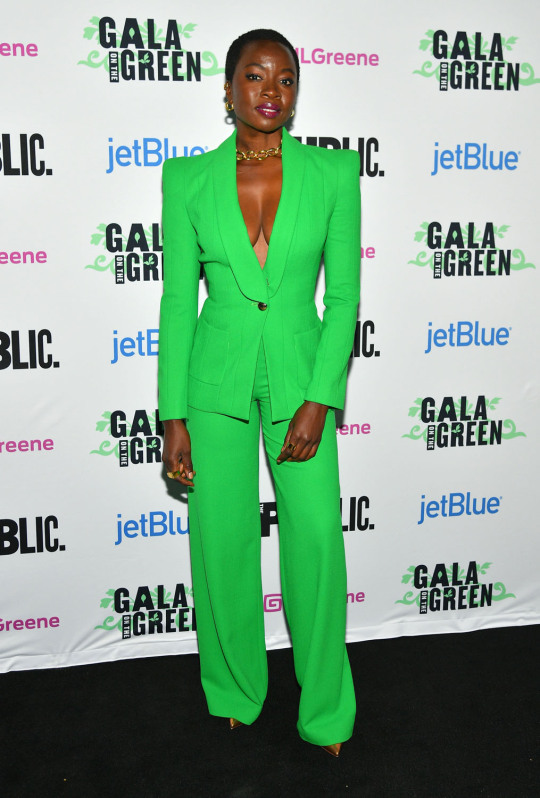
Danai Gurira attends 2022 Public Theater Gala on The Green at The Delacorte Theater on May 24, 2022 wearing Sergio Hudson
#danai gurira#sergio hudson#SPRING 2022 READY-TO-WEAR#twd cast#twd family#the walking dead#marvel#black panther#wakanda forever#danai#fashion#gala on the green#the public theater#gold#green#suit#general okoye#michonne#queen#playwright#marvel women#mcu women#richard iii#shakespeare in the park
8 notes
·
View notes
Text
'for colored girls who have considered suicide/when the rainbow is enuf' Amazing!
‘for colored girls who have considered suicide/when the rainbow is enuf’ Amazing!
for colored girls who have considered suicide/when the rainbow is enuf (Marc J. Franklin)
When you have contemplated suicide, the rainbow with all its Biblical and mythological significance is not enough. The pain is cyclical, repetitive and cataclysmic until you end it. However, in ntozake shange’s choreopoem, for the empowering community of black women shining through the clouds of history to…
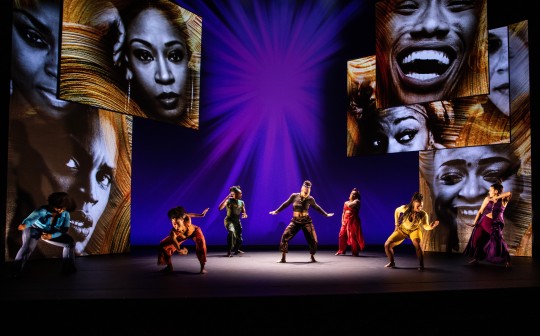
View On WordPress
#Boothe Theatre#Camille A. Brown#For Colored Girls Who Have Considered Suicide/When The Rainbow is Enuf#Ntozake Shange#The Public Theater
2 notes
·
View notes
Text
Public Theater Brings "The Ally" Forward for an Intense Debate
#frontmezzjunkies reviews:
@PublicTheaterNY's #TheAllyPlay
by #ItamarMoses
d: by #LilaNeugebauer
w/ #JoshRadnor
#CheriseBoothe
#ElijanJones
#MichaelKhalidKaradsheh
#JoyOsmanski
#BenRosenfield
#MadelineWeinstein
#ThePublicTheater #OffBroadway
Josh Radnor in The Ally at The Public Theater. Photo credit: Joan Marcus.
The Off-Broadway Theatre Review: Public Theater’s Ally
By Ross
So here’s the pickle. This play, The Ally, clocking in at a far too long two hours and forty minutes, throws controversy at you in numerous long-winded speeches one after the other, filling your brain with details and complexities that clash and do battle…
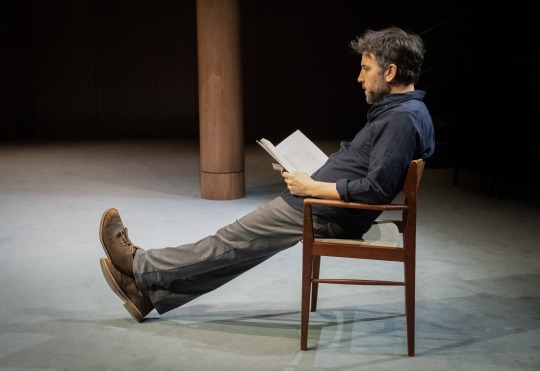
View On WordPress
0 notes
Text
Family Resemblance
....
....
....
.....
I
....
I had another 11pm brain worm.
Enjoy
-x-x-
Daniel Wayne, the younger toddler brother of Bruce Wayne and the son of Martha and Thomas Wayne had been kidnapped the night their parents were murdered.
Daniel had been snagged the moment their killer heard people headed to the alley and Bruce in his state of shock didn't realize it until it was far to late and could only scream in horror (from everything) as his baby brother is crying his name. (If you wanna make it even more heart wrenching, make it Danny's first time being able to say Bruce's name right and/or Bruce had said some mean things to Danny earlier after he accidentally broke something of Bruce's, something like 'I wish youd go away' or 'I never wanted a brother, you're such a bother!')
Bruce is being held by Alfred as some police officers are chasing down the Wayne's parents killer while some stay behind to see if they could do something.
Minutes turn to hours and as they wait, praying the police at least found Danny, Bruce is ridden with guilt. From his parents death to allowing his brother to be kidnapped.
Eventually the police return to give Alfred and Bruce the news. And it's not good.
The killer escaped and Danny was nowhere to be found.
And it would take many years before he would be found.
-x-x-
Bruce gets a call from Damian during school hours one day. When he answers he is greeted with Damian demanding him to get to the school and explain himself.
Confused Bruce asks what does he mean and Damian responds with
"The two new students in class today are the spitting images of you and I father! Either they are poorly created clones or you have more hidden blood children!"
-x-x-
Meanwhile the very students being discussed are calling up someone too
"Ellie? Dan? What's wrong? You better not have made too much chaos already, I just paid for the uniforms for that place."
"DAD! I THINK ANOTHER ONE OF THE FRUITLOOPS FAILED CLONES SOMEHOW SURVIVED!"
"What?"
#danny phantom#danny fenton#crossover#dp x dc#blue rambles#danny phantom dc#writing ideas#random idea#dpxdc#bruce and danny are siblings#danny was a toddler when he was kidnapped#somehow someway he escaped or was dumped out of Gotham#due to how young Danny was and how traumatized he was about that night he forgot everything but his first name#no one really connected the dots that Danny was the missing Wayne child#mostly due to no public photographs of Danny#he had been born very early and no one was sure he was going to make it#and going to the theater had been his first time being finally allowed out of the manor#only for it to end in tragedy#years later though#Danny moves to Gotham with his kids#a deaged and raised from infanthood Danielle 'Ellie' Fenton and Dante 'Dan' Fenton#Damian was not ready to see them#he thinks theyre poorly made clones since one looks more like his father than him and the other is a girl#or more secret children his father didnt know about#Ellie and Dan think Damian is an escaped clone of Vlads#Bruce and Danny meet at the school and Bruce nearly has a heart attack at the young man who looks so much like his parents#Danny is a bit weirded out because Bruce looks very familiar somehow
1K notes
·
View notes
Text

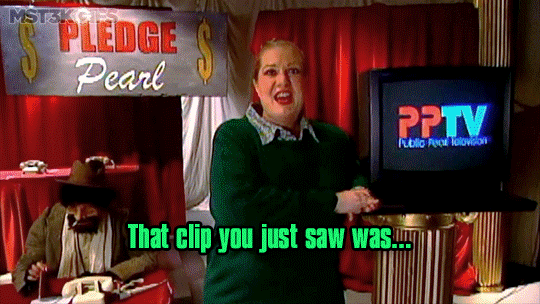
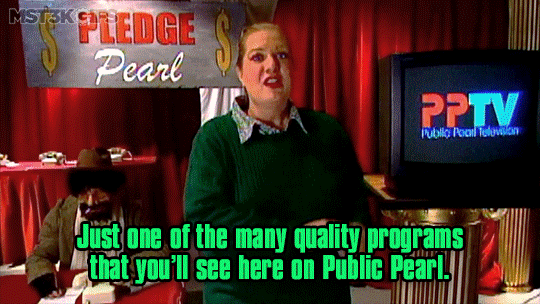
What's your favorite show here on Public Pearl? Oh, sure. I love that show. Jeremy Brett is one of the best. Thanks for helping out.
#mst3k#mystery science theater 3000#pearl forrester#are you being served?#public television#mary jo pehl#overdrawn at the memory bank
177 notes
·
View notes
Text
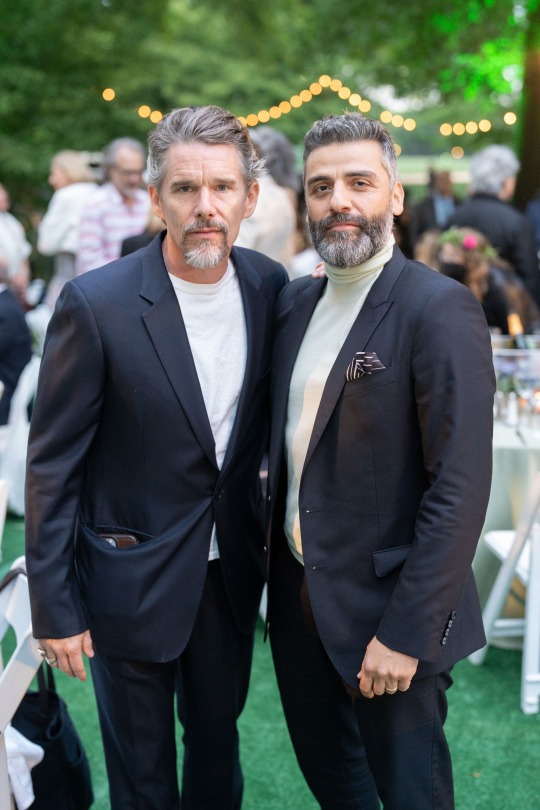
Il materiale di origine: Variety / Ethan Hawke and Oscar Isaac attend The Public Theater’s Gala On The Green at The Delacorte Theater in New York City (24th May, 2022)
#oscar isaac#ethan hawke#moon knight#the public theater#gala on the green#the delacorte theater#central park#new york city
323 notes
·
View notes
Text

the star of the show 💫
#she spins!! forever! harrowing if you think about it too much#very inspired by angelina ballerina NOT THE 3D monstrosity#i painted the curtains the rocks the floor and the tree with inks/watercolours#and the cat (i named her agnes) i animated in procreate#the bg is a painting by samuel davis i loveeee public domain artworks<3#enjoyyyy#mixed media#ballet#theater#artists on tumblr#animation#illustration#art#jitterbugbear art#digital art
129 notes
·
View notes
Text




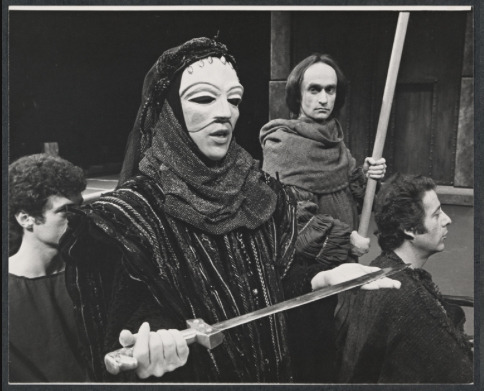


john cazale as agamemnon in agamemnon (1977 broadway production & rehearsals) photographed by friedman-abeles
#me.txt#john cazale#people#photography#theater tag#mythology tag#house of atreus#aeschylus#couldnt find the name of the specific photographer SAD but thank you for yr service#learned about this tonight & will never be normal again#the last photo... unreal. im obsessed with him#shoutout to the new york public library digital archive kissing you sloppy with tongue this is making me consider library science as a majo#again. shoutout to archivists & librarians too for preserving these things for people
62 notes
·
View notes
Text
World’s first transmac absent father

#cocaine bear#I’m queueing this post#I said this to my friends as we left the theater and I don’t think they got it but WHATEVER#Whenever this post posts we will see what the public thinks
251 notes
·
View notes
Text
'Raisin in the Sun,' a Glorious, Triumphant Revival at the Public
Don't miss this incredible revival starring Tonya Pinkins at the Public Theater, with Robert O'Hara directing.
Mandi Masden, Tonya Pinkins, and Toussaint Battiste in The Public Theater revival of A Raisin in the Sun, directed by Robert O’Hara (Joan Marcus).
Raisin in the Sun by Lorraine Hansberry, aptly titled referencing the Langston Hughes’ poem, “A Dream Deferred,” is enjoying its fourth major New York City revival. It debuted on Broadway to great acclaim in 1959 and followed with two other Broadway…
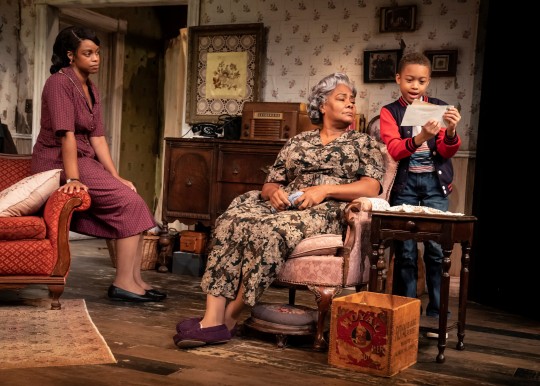
View On WordPress
#Francois Battiste#John Clay III#Lorraine Hansberry#Mandi Masden#Mister Fitzgerald#Paige Gilbert#Raisin in the Sun#Robert O&039;Hara#The Public Theater#Tonya Pinkins
1 note
·
View note
Text
"Hell's Kitchen" is on Fire, Igniting the Genre Masterfully as it Elevates the Girl from The Public to Broadway
#frontmezzjunkies reviews:
#HellsKitchenMusical
music/lyrics by #AliciaKeys
book by #KristofferDiaz
d: #MichaelGreif
ch: #CamilleABrown
w/ #ShoshanaBean
#BrandonVictorDixon
#KeciaLewis
#MaleahJoiMoon
@PublicTheaterNY
@aliciakeys @HellsKitchenBway
Maleah Joi Moon (foreground) and the company of the world premiere production of Hell’s Kitchen at The Public Theater. Photo Credit: Joan Marcus.
The Off-Broadway Theatre Review: Public Theater’s Hell’s Kitchen
By Ross
Charging its way from off-Broadway’s The Public Theater to Broadway as fast as can be, we have been gifted with the latest jukebox musical pulled from the playlist of Alicia…
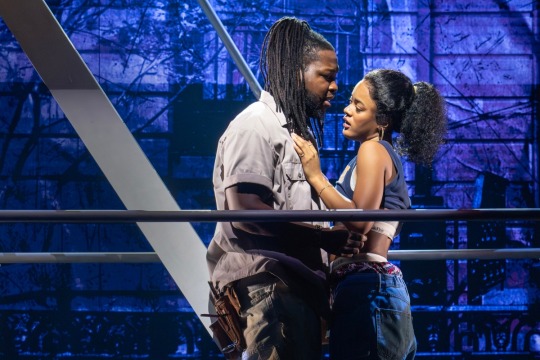
View On WordPress
#Alicia Keys#Hell&039;s Kitchen#Jukebox Musical#Michael Greif#new musical#off broadway#The Public Theater
0 notes
Text
On today's episode of, there's a musical about basically everything;
Have you ever wished you could see two true crime fanatics actually solve a murder, rather than talking about them on podcasts? Now you can!

Are you a Great British Bake Off fan? We got you covered.

Do you... Like public bathrooms? That's... Yeah we have that too!

Donald Trump with some sort of artistic subversion that I couldn't figure out? You bet we have it.
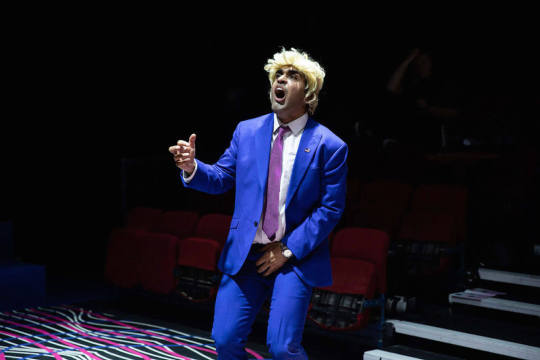
(Not technically a musical, but) Lesbians;; can sing... So... That's cool.
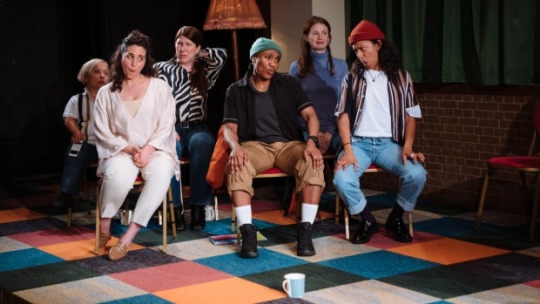
Musicals, in order:
Kathy and Stella Solve a Murder! (by Jon Brittain and Matthew Floyd Jones) | Great British Bake Off: The Musical (by Jake Brunger and Pippa Cleary) | Public - The Musical (by Kyla Stroud) | Trump L'oeil: The Musical (by Henry Parkman Biggs) | The Ministry of Lesbian Affairs (by Iman Qureshi)
#musical theatre#musical theater#kathy and stella solve a murder#gbbo#great british bake off#great british baking show#great british bake off musical#public - the musical#trump L'oeil#the ministry of lesbian affairs#edinburgh music festival#broadway#theatre#theater#edinburgh fringe
133 notes
·
View notes